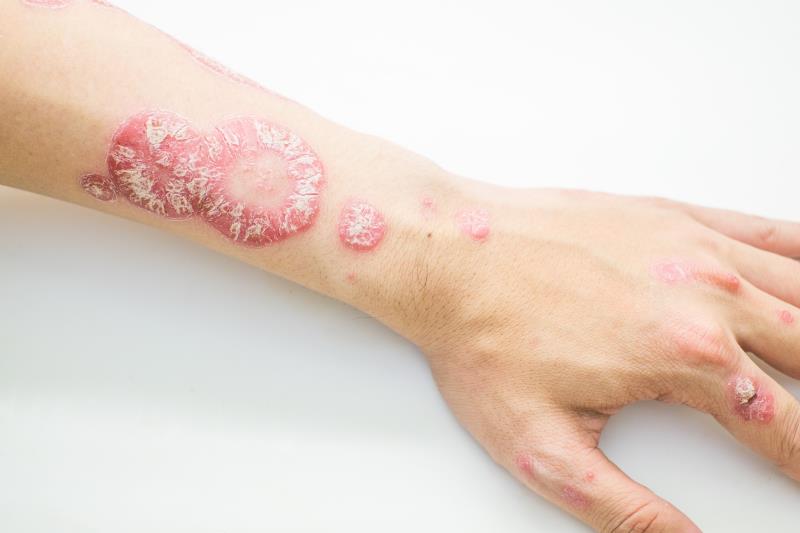
The phase III FUTURE 2 trial has shown the ability of the bDMARD*, interleukin(IL)-17A inhibitor secukinumab to provide sustained improvements across multiple clinical domains in patients with psoriatic arthritis (PsA) with consistent safety over 5 years.
“PsA is a lifelong condition, requiring access to durable therapeutic agents. Early diagnosis and assessment of disease severity is important for timely treatment initiation, leading to sustained long-term therapeutic benefit and quality of life (QoL),” said the researchers. [Clin Exp Rheumatol 2008;26:S62-S65; Rheum Dis Clin North Am 2012;38:373-386]
“[Our initial findings revealed that] secukinumab 150 and 300 mg offered sustained and clinically meaningful improvements in joint and skin symptoms, physical function, and QoL in patients with active PsA over 2 years,” said the researchers. [Lancet 2015;386:1137-1146; Rheumatology 2017;56:1993-2003] The current findings confirm the clinical benefit and safety of long-term IL-17A inhibition in this setting, they added.
A total of 397 participants (65 percent TNFi**-naïve, 47 percent receiving concomitant methotrexate) were randomized 1:1:1:1 to receive secukinumab 75, 150, or 300 mg, or placebo weekly from baseline and then Q4W from week 4. Secukinumab dose was increased (from 150 to 300 mg; from 75 to 150 or 300 mg) from week 128 or if active signs of disease were observed. The escalated dose was maintained thereafter. Sixty-two percent completed 5 years of treatment. [Lancet Rheumatol 2020;2:e227-235]
At 5 years, ACR20/50*** responses were similar in the secukinumab 150- and 300-mg arms (79/46 percent [150 mg] and 74/48 percent [300 mg]). These responses were sustained regardless of baseline methotrexate use (74/47 percent and 63/38 percent, respectively).
The improvements with secukinumab were also sustained through 5 years regardless of TNFi history, with better responses among TNFi-naïve patients than those exhibiting intolerance or insufficient response to TNFis, said the researchers. “[T]herefore, IL-17A inhibitors deserve consideration for earlier use in the treatment paradigm.”
Taken together, these results provide reassurance that long-term treatment with secukinumab provides sustained efficacy for PsA patients who are either naïve, intolerant, or had an inadequate response to TNFis, said the researchers.
ACR20/50 responses were also sustained among secukinumab 150-mg recipients who increased their dose (from 75/45 percent [week 128] to 71/41 percent [week 260]). The Sankey-style overlay analysis also revealed that more patients had improved ACR responses following dose escalation. “[These highlight] the potential benefit of dose escalation from 150 to 300 mg in patients with suboptimal response to secukinumab 150 mg,” noted the researchers.
The discontinuation rate among secukinumab 150/300 mg recipients was 35 percent, which mirrored the rates reported in other PsA trials. [Ann Rheum Dis 2014;73:1689-1694; Clin Rheumatol 2018;37:3285-3296] With no new or unexpected safety signals reported, these findings underscore the consistent and satisfactory safety profile of secukinumab.
Taking the IL-17 route
“The IL-17 pathway is crucial in the pathogenesis of PsA,” said the researchers. As such, the EULAR#, GRAPPA##, ACR, and National Psoriasis Foundation recommend IL-17A inhibitors as first-line treatment option following TNFi treatment to manage the various clinical manifestations### of PsA. [Ann Rheum Dis 2016;75:499-510; Arthritis Rheumatol 2016;68:1060-1071; Arthritis Care Res 2019;71:2-29]
Evaluating the long-term efficacy, safety, and tolerability of biologics is important given the chronic nature of PsA. [RMD Open 2018;4:e000596] The current findings add to the growing evidence on IL-17 inhibition in PsA. Collectively, these data may help guide physicians in their treatment decisions to better manage patients presenting with different manifestations of PsA, noted the researchers.
The 1-year results of a head-to-head trial (secukinumab vs adalimumab) in PsA shall be reported in the future, they added.